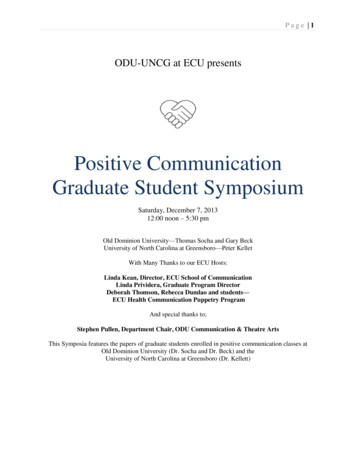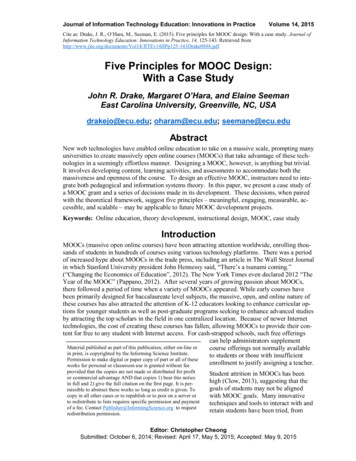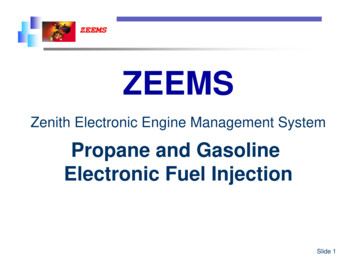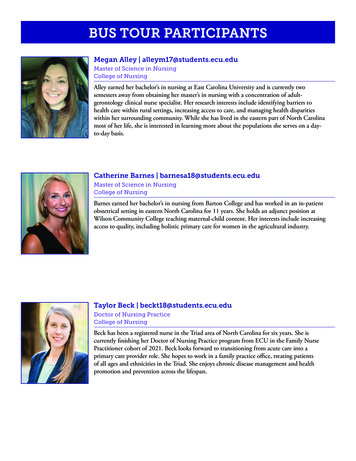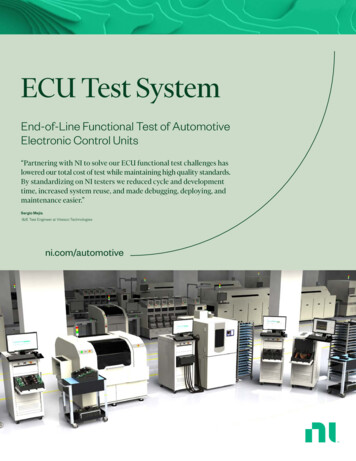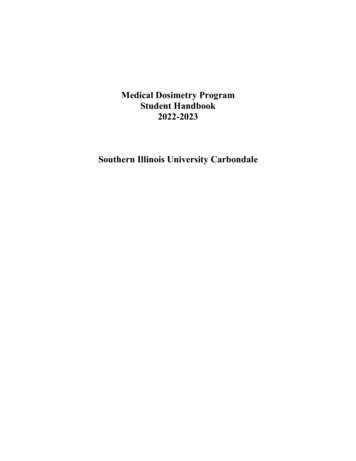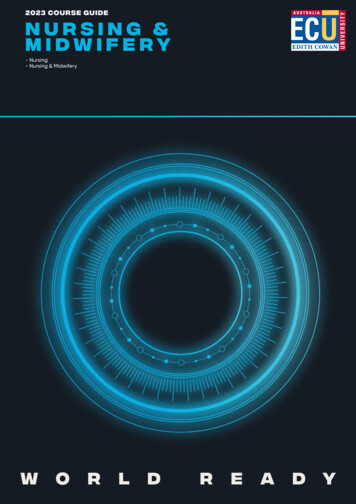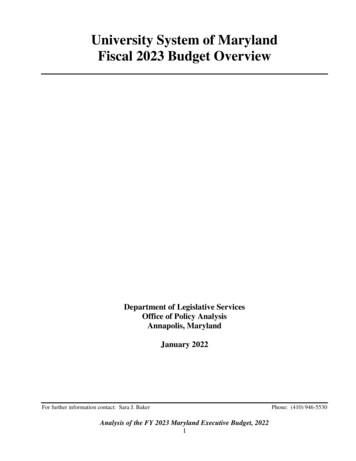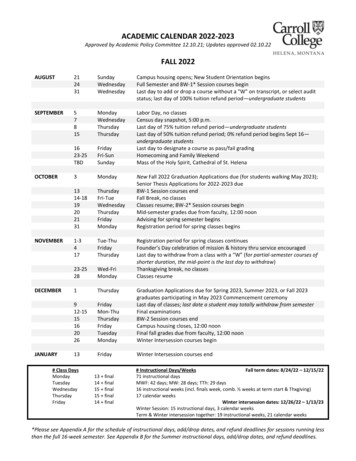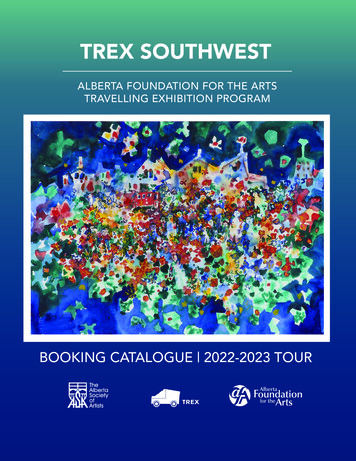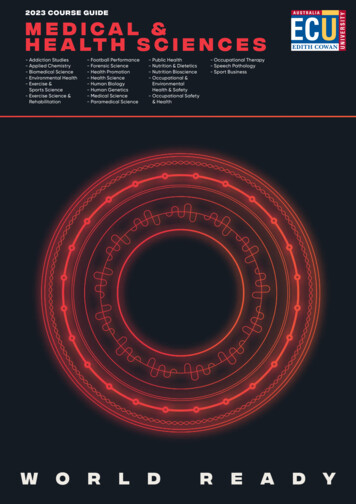
Transcription
2023 Cou rse Gu i deM E DICAL &H E A LT H S C I E N C E S- Addiction Studies- Applied Chemistry- Biomedical Science- Environmental Health- Exercise &Sports Science- Exercise Science &RehabilitationWO- Football Performance- Forensic Science- Health Promotion- Health Science- Human Biology- Human Genetics- Medical Science- Paramedical Science- Public Health- Nutrition & Dietetics- Nutrition Bioscience- Occupational &EnvironmentalHealth & Safety- Occupational Safety& HealthRDL- Occupational Therapy- Speech Pathology- Sport BusinessREADy
STUDYLIKE SOMEONE’SLIFE DEPENDSON IT.Medical & Health Sciences at ECUBe World Ready.ECU’s School of Medical and Health Sciences teaches an exciting and diverse range of disciplines.Courses include Biomedical Science, Exercise and Sports Science, Exercise Science andRehabilitation, Health Science, Occupational Therapy, Paramedical Science, and Speech Pathology.As a student, you’ll have access to state-of-the-art facilities and specialised laboratories whereyou’ll put theory into practice. Our courses also provide a basis for honours and postgraduatestudies, laying the groundwork for a future career in health and medicine.becomeworld readyat ecu.Students big winners fromsportING partnershipsGet hands-on with accredited,practical coursesContentsMedical & Health Sciences at ECU3Careers in FocusBachelor of Science (International Exerciseand Sports Science)1819Environmental Health, Occupational Health & Safety,Occupational Hygiene4Bachelor of Science (Exercise and Sports Science) /Bachelor of Commerce (Sport Business)Nutrition, Dietetics & Health Promotion6Bachelor of Science (Occupational Therapy)20Exercise Science8Bachelor of Speech Pathology21Diploma of Environmental Health11Bachelor of Science (Paramedical Science)22Bachelor of Health Science12Postgraduate Study23Bachelor of Science (Biomedical Science)14Postgraduate Coursework24Bachelor of Science (Exercise and Sports Science)16Admission Pathways to ECU28Applying to ECU30Facilities, Services & Support31Bachelor of Science (Exercise Scienceand Rehabilitation)17ECU is committed to reconciliation and recognisesand respects the significance of Aboriginal andTorres Strait Islander peoples’ communities, culturesand histories. ECU acknowledges and respects theNoongar people as the traditional custodians ofthe land on which our campuses are sStudents studying sports-related courses cantake advantage of our strong sporting industrynetwork. ECU is partnered with the West CoastEagles and Perth Glory, providing numerousbenefits for our students, including:In our professionally-accredited undergraduate coursesin Exercise Science and Rehabilitation, OccupationalTherapy, Paramedical Science, Speech Pathology, andpostgraduate Nutrition and Dietetics, you’ll have accessto well-equipped laboratories with specialised equipmentand simulated environments. Before attending clinicalplacements, you’ll use these facilities to practice hands-onskills. Our staff have strong clinical backgrounds, so theyknow how to prepare you for entry into the health system.y Work Integrated Learning (placement)opportunities within the clubs’ footballdepartments where you can apply yourknowledge and learn from some of the bestsports performance analysts in the game.CLINICAL TRAINING OPPORTUNITIESFOR ALLIED HEALTH STUDENTSy Volunteer opportunities to work with the clubsand gain experience at key events duringthe season.The Joondalup Community Clinical School is apurpose‑built clinical training facility located atJoondalup Health Campus. Students provide services tothe community including nutrition and dietetics, exercisephysiology, speech pathology, and occupational therapy.The student led Joondalup Community Clinical Schoolbenefits the community with the provision of high quality,inter-professional, evidence based care to a wide range ofclients to assist with the management of chronic disease,mental illness, neurological conditions and general health.The clinic provides opportunities for students to contributeto client assessments and interventions.y Access to club facilities, including the ECUHigh Performance Centre located at MineralResources Park, which incorporates highperformance equipment and technology forelite athletic performance and testing.y Invitations to attend unique events, tour thefacilities and hear from industry guest speakers,improve your networks, and demonstratehow your knowledge can be applied in thereal-world.These exciting Work Integrated Learningopportunities are highly sought after by studentsfrom Bachelor of Science (Exercise & SportsScience) – page 16, Bachelor of Science (ExerciseScience and Rehabilitation) – page 17 and theBachelor of Science (Exercise & Sports Science)/Bachelor of Commerce (Sport Business) doubledegree – page 19.3
How do you get started?Careers in FocusECU’s Bachelor of Health Science course is a great starting point for a career in occupational health and safety oroccupational hygiene. There are different study pathways available to best suit your needs:Start hereor start hereDiploma ofEnvironmentalHealth1 year full-timeSee page 11 for morecourse detailsBachelor ofHealth Science3 years full-timeSee page 12 for morecourse detailsAUTHORISED TECHNICIANDepartment of Health andLocal GovernmentProvides up to one year credit andrecognition of prior learning towardsBachelor of Health Science and can beused as an entry pathwayWant a career where you get awayfrom a desk and visit all kindsof workplaces?OCCUPATIONAL &ENVIRONMENTAL HEALTH& SAFETY MAJORProvisionally accreditedLike the idea of helping people stay safe at work? Interested in problem-solving?What about communicating with people, or delivering training?OCCUPATIONAL SAFETY& HEALTH MAJORProfessionallyaccredited, nationallyand internationallyIf you answered ‘yes’ to these questions, maybe you should explore a career in environmental health,occupational health and safety (OH&S) or occupational hygiene.What do environmental health officers do?Where will you work?y Implement prevention programs and strategies forthe control of communicable diseases, such as majoroutbreaks like coronavirus.Most occupational health and safety professionals workin government or in medium to large organisations,all over Australia.y Mitigate health risks associated with environmentaldisasters such as those caused by bushfire and floods.In Western Australia, many of our occupational health andsafety graduates work in the mining or oil and gas industries.y Ensure public safety during major events and inpublic places.What do occupational hygienists do?Where will you work?Environmental health officers are appointed as authorisedofficers under various acts and regulations. They work inlocal, state and federal government health departments,as well as in the resources sector and many privateorganisations that handle large quantities of high risk food,such as supermarket chains, airlines and hotel groups.What do OH&S officers do?y Visit a workplace and talk to people about what they do.Analyse this information along with research about‘what could go wrong’.y Develop and communicate recommendations to theworkforce and the management team to ensure theycomply with laws and good practice.y Investigate workplace incidents to find out what actuallyhappened, and provide recommendations to preventfuture incidents.Occupational hygienists are usually more highly qualifiedthan OH&S professionals and investigate a range of chemical,physical and biological hazards.Department of Healthand Local GovernmentMaster of Occupational Hygieneand Toxicology2 years full-time See page 27 for more course detailsOccupational hygienists:y Collect and analyse samples to assess worker exposure tophysical, chemical and biological agents.Professionally accredited,nationally and internationallyy Evaluate the effectiveness of control strategies implementedto protect against workplace exposures and hazards,e.g. personal protective equipment, ventilation systems.y Interpret the results of exposure evaluations and determinerisk to human health, based on scientific research and,recommend ways to control workplace hazards throughengineering methods, improved work procedures andprotective equipment.What does the future look like for occupationalhealth and safety related roles?It’s expected that employment will grow very stronglyover the next five years*, with most of the positions beingfull-time roles.*Source: Joboutlook.gov.au, January 2022.4AUTHORISED OFFICER“A WORK PLACEMENT WAS ONE OF THE BEST LEARNING EXPERIENCESI HAVE HAD.”Taking a work placement as part of my course was probably one of the best learningexperiences I have had so far, but what made it positive was foremost, the motivation factorand a strong desire to learn new skills. I have now completed 200 hours of work experiencerelated to my studies. This has provided me with the necessary knowledge, skills, andpersonal characteristics that employers seek, such as time management, interpersonal skills,teamwork and communication skills. I know I will be able to apply what I have learned in myfuture career.Patricia KouakouECU Environmental Health student5
How do you get started?Careers in FocusECU offers different pathways to become a nutritionist, dietitian, or health promotion professional. To become an accreditedpractising dietitian, you can apply to study for a Masters qualification after you’ve finished your Bachelor’s degree.PathwayOnePathwayTwoPathwaythreeBachelor of Health Science3 years full-time See page 12 for more course detailsBachelorof Science(BiomedicalScience)3 years full-timeSee page 14for more coursedetailsBachelorof Science(Exerciseand SportsScience)3 years full-timeSee page 16for more coursedetailsCan be studiedas a dual majorHEALTHPROMOTION MAJORNUTRITIONMAJORAre you interested in healthy eatingand what’s in the food we eat?Like the idea of helping people or communities to improve their health? Would you becomfortable communicating dietary and health information to lots of people?If you answered ‘yes’ to these questions, maybe you should explore a career in nutrition, dietetics or health promotion.What do nutritionists do?What do health promotion professionals do?y Provide evidence based nutrition services relatedto public health nutrition, policy, research andcommunity health.y Identify audiences most at risk and establish theappropriate method(s) to promote health and assistwith behaviour change.y Plan diets and menus for groups and populations,calculate nutritional values of food served and helppeople understand how to plan and prepare foodto improve health and wellbeing.y Engage schools, community and vulnerable groupsto increase awareness about personal health andglobal health issues.y Design, conduct and evaluate nutrition andpopulation health intervention programs andcompile educational material.What do dietitians do?Dietitians can provide the same range of evidence basednutrition services as nutritionists, but are also qualified to:y Provide evidence based nutrition services as well asindividual dietary counselling, medical nutrition therapyand group dietary therapy.y Work with other health professionals to manage thedietary and nutritional needs of individuals.y Influence food providers and governments onfood-related policies and practices that support health.REGISTERED HEALTHPROMOTIONPRACTITIONER(INTERNATIONALUNION FOR HEALTHPROMOTION ANDEDUCATION)ASSOCIATENUTRITIONIST(NUTRITION SOCIETYOF AUSTRALIA (NSA))NUTRITIONBIOSCIENCE MAJORMaster ofNutritionandDietetics1.5 years full-timeSee page 26 formore coursedetails3 YEARSEXPERIENCEy Work with partners to write materials and educatethe community.y Undertake research to ensure data is up-to-date,relevant and translated for use by the community.Where will you work?Nutritionists, dietitians and health promotionprofessionals work in many regions across Australia, andin industries such as health care and social assistance,local government, hospitals, education and training.What does the future look like?Very positive! Employment of dietitians, nutritionists andhealth promotion professionals is projected to show stronggrowth over the next 5 years.*More professionals will be needed in these fields to addressAustralia’s growing and ageing population and to tackletrends such as the rise in obesity.*Source: Joboutlook.gov.au, January 2022.EXERCISE SCIENTISTProfessionally accreditedby Exercise and SportsScience Australia (ESSA)REGISTEREDNUTRITIONIST(NSA)Eligible for fullmembership withDietitians Australia andAccredited PractisingDietitian (APD) ProgramMaster ofNutritionandDietetics1.5 years full-timeSee page 26 formore coursedetails“BECOMING A DIETITIAN WAS THE PERFECT CAREER FOR ME.”I have always had a strong desire to help other people. I also consider health andwellbeing one of the most important aspects of being happy. So, to combine thesetwo things, becoming a dietitian was the perfect career for me.The clinical placements allowed me to put all of the theory I learnt into practice.My eyes were opened to what working as a Clinical Dietitian involved and only mademe more excited for my future career.Amy ThomsonECU Nutrition and Dietetics & Health Science graduate67
How do you get started?Careers in FocusThere are two starting points to kick off a career in Exercise Science. And as you can see below, there are alsooptions for further study, depending on your choice of specialisation.Professionally accreditedby Exercise and SportsScience Australia (ESSA)Are you interested in fitnessand general wellbeing?If you answered ‘yes’ to these questions, maybe you should explore a career in Exercise Science.ECU offers courses which lead to three distinct accredited professions in the health and fitness and professional sportsindustries. You could study to become an exercise scientist, exercise physiologist, or a strength and conditioning coach.What do exercise scientists do?Where will you work?y Assess, design and deliver exercise and physicalactivity programs.AEPs work in varied settings including public and privatehospitals, multidisciplinary clinics, workplace health andrehabilitation, residential aged care facilities, sportingsettings, government and education.y Use exercise to improve people’s health and fitness,wellbeing or performance.y Use exercise to prevent chronic health conditions.y Promote and implement the adoption of physicalactivity and/or exercise with individuals, communities,and specific populations.Where will you work?Exercise scientists work worldwide in varied roles includingfitness, coaching, sport, community health, healthpromotion, corporate health, wellbeing, employmentscreening and aged care.What do exercise physiologists do?In addition to the roles undertaken by exercise scientistsabove, Accredited Exercise Physiologists (AEPs) arequalified to:y Assess, plan and implement exercise programs forpreventing and managing chronic diseases and injuries,such as cardiovascular disease, diabetes, osteoporosis,depression, cancer and arthritis.y Assist in restoring optimal physical function, and healthand wellness.y Educate people in rehabilitation procedures, includinghome exercises and lifestyle changes, to enhancepatients’ health and wellbeing.8or start hereBachelor of Science(Exercise andSports Science)3 years full-timeSee page 16 for morecourse detailsBachelor of Science(Exercise Scienceand Rehabilitation)4 years full-timeSee page 17 for morecourse detailsBachelor of Science(Exercise Scienceand Rehabilitation)1 additional year full-time(with credit and recognitionof prior learning)EXERCISE SCIENTISTDo you like the idea of helping other people improve their lifestyle or sports performance throughexercise? Are you a good communicator, able to relate to all kinds of people?Start hereExercise Science(Strength andconditioning)6 months to 1.5 years full-timeCourses offered at graduatecertificate and masters level*See page 25 for morecourse detailsExercise Medicine(Oncology)6 months to 1.5 years full-timeCourses offered at graduatecertificate, graduate diplomaand masters levelSee page 26 for morecourse detailsEXERCISEPHYSIOLOGISTProfessionally accreditedby Exercise and SportsScience Australia (ESSA)What does the future look like for exercisescientists and exercise physiologists?More professionals will be needed in these fields toaddress Australia’s growing and ageing population,to tackle trends such as the rise in obesity levels and theemergence of exercise as medicine for cancer patients.What do strength and conditioningcoaches do?y Design and implement strength training andconditioning programs in-season, off-season,and pre-season for athletic programs.y Work in cooperation with sports medicine or athletictraining staff in the rehabilitation and strengthening ofinjured athletes.y Develop systems for tracking athlete attendance andathlete progress in conjunction with the sport coaches.Where will you work?Strength and conditioning coaches are employed acrossAustralia and throughout the world. This includes workingwith professional and amateur sports, as well as workplaceswith high physical demands, such as the military, police andfire and emergency services.*Masters graduates are eligibleto apply for level 2 Accreditationwith the Australian Strength andConditioning Association“I DID MY RESEARCH BEFOREHAND AND FOUND EXERCISE & SPORTSSCIENCE CAN PAVE THE WAY FOR DIFFERENT CAREER PATHS.”The course has taken my personal training to the next level (evidence-based training).It has also given me the opportunity to work with the West Coast Eagles.I did my research beforehand and found Exercise & Sports Science can pave the wayfor different career paths. Strength and conditioning, exercise physiology and teachingphysical education to name a few, but there are so many more.I chose ECU because of their corporate partnerships with some of our country’s biggestsporting organisations, including the West Coast Eagles and Perth Glory.Ricky LeGuayECU Exercise & Sports Science student9
Medical andhealth sciencesworLD READYDiploma ofEnvironmental HealthSWOLEdith Cowan University conducts ground-breaking research in a range of areas relating to healthand wellbeing. This includes developing revolutionary new treatments for spinal cord injuries,the development of exercise as medicine for cancer patients, and utilising blood tests to detecthaemochromatosis and melanoma.Full-time * * *Part-time Through their highly-skilled approaches and dedicationto their work, ECU researchers continue to advanceand revolutionise the ways we can improve the healthof Australians, with the creation of pioneering studies,innovative tests and life-changing tools.Exercise is MedicineECU is behind a world first approach to cancertreatment, whereby patients have supervisedprescribed exercise programs on the same day theyreceive their chemotherapy or radiation treatment.This treatment revolution is largely a result of thework of ECU’s Exercise Medicine Research Institute,within the School of Medical & Health Sciences.Western Australia’s 2019 Scientist of the Year andECU Professor Rob Newton has spent over 15 yearsdeveloping exercise medicine for the managementof cancer.Pre-practicum PreparationIndicative ATAR: Not ApplicableDuration: 1 year full-time or part-time equivalentAvailability & Campus:JOML*S tudents can only commence full-time study if commencingin Semester 1.Prepares students to make a positive contribution tothe health of communities. Students graduate with theability to think critically about prevention and control ofcommunicable and environmental disease and a range ofother environmental health issues, to work independentlyand as part of a team, and plan and coordinateenvironmental health projects.PracticumStudents undertake a professional placement unit whichcomprises a 200 hour placement in an environmentalhealth department. There are attendance requirements forthis practicum.To be eligible to undertake practicum placementsstudents are required to complete a range of differenttasks (for example, obtaining a police clearance, receivingimmunisations and completing first aid training). For moreinformation, see course details on our website.Non-Standard TimetableOn-campus students: The Communicable Disease Controlunit (HST2184) is only available to study online.Employment OpportunitiesGraduates will be employable in state government,shire and city health departments in a support role toenvironmental health officers.CareersEnvironmental Health Assistant, Environmental HealthCadet, Environmental Health Technical OfficerSee more course informationecu.edu.au/courses/C54Professor Newton says in the beginning it was a bitof a step into the unknown for oncologists becausechemotherapy is a very difficult journey for a patient,and we were proposing to have their patientsexercise on top of that.“Now the results we are seeing from the patients arejust fantastic,” he says.Research leader, ECU’s Professor Daniel Galvao, says,“there is emerging evidence that reaching a certainlevel of fitness can reduce the chance of death fromcancer by as much as 50 per cent.”To find out more, visitecu.edu.au/research/worldclass/exerciseECU CityComing IN 2025Our new campus in the heart of the Perth CBDwill represent the future of university education– urban, connected, integrated with businessand community – and part of the lifebloodof a thriving city.ECU City will seamlessly bring together Creative Industries,Business and Technology to deliver a world-class universitycampus that transforms the city of Perth.To follow the journey, visit www.citycampus.ecu.edu.au10Campus keyJOMLSWOL Available at the Joondalup CampusAvailable at the Mount Lawley CampusAvailable at ECU South West, BunburyAvailable onlineCross Campus attendance requirementPlease note accreditation or professional recognitiondetails are correct as at time of print.For latest information please visit ecuworldready.com.au11
Bachelor ofHealth ScienceIndicative ATAR: 70Duration: 3 years full-time or part-time equivalentAvailability & Campus:JOMLSWOLFull-time Part-time Some majors can only be studied on-campus and studentsshould refer to the delivery options listed against each major forfurther details.ECU South West: Please note that only the Majors ofOccupational Safety and Health, Nutrition, Health Promotionand Occupational and Environmental Health and Safety can bestudied on-campus.Health Science is broad, but essentially, it’s all aboutenhancing the health of communities. That includestackling a range of health-related societal problems, suchas obesity, harmful alcohol and drug use and even dealingwith a global pandemic!In this degree, you’ll study the core concepts of publichealth and access tools that will prepare you for the realworld. Studying Health Science at ECU will give you skillsto not only assess and monitor health situations, but you’llalso learn intervention strategies so you can make adifference to the lives and health of others. You’ll also gainvaluable industry experience through a work placement inyour final year.And because you have a choice of one or more majorsubjects in this degree, you’ll learn specific skills in an areathat interests you. The Bachelor of Health Science givesyou a choice of six majors – Addiction Studies, HealthPromotion, Nutrition, Nutrition Bioscience, Occupationaland Environmental Health and Safety, and OccupationalSafety and Health.CareersYou’ll be surprised how many diverse workplaces havecareer opportunities for our Health Science graduates.Child Health Officer, Community Health Officer,Environmental Health Officer, Health Promotion Officer,Health Worker, Health Promotion Nutritionist, Nutritionist,Occupational Safety and Health Management Officer,Youth WorkerPracticumAvailable Majors:Students are required to complete 75 hours of ProfessionalPractice in their 3rd year of study. There are attendancerequirements for this practicum.Addiction Studies Health Promotion Nutrition Nutrition Bioscience Occupational and EnvironmentalHealth and Safety Occupational Safety and Health Pre-practicum PreparationTo be eligible to undertake practicum placementsstudents are required to complete a range of differenttasks (for example, obtaining a police clearance, receivingimmunisations and completing first aid training). For moreinformation, see course details on our website.Employment OpportunitiesEmployment opportunities exist within a range ofworkplaces including aged care facilities and hospitals,rural and regional settings, asthma/diabetes/cancer/injury prevention councils, heart foundations, familyplanning associations, alcohol and other drug agencies,mining, oil and gas industries, community developmentand local government organisations, disability services,justice and correctional agencies, research institutes,international aid organisations, and mental healthsupport agencies.JOMLSWOL See more course informationecu.edu.au/courses/K97#1“THE VARIETYOF PRACTICALEXPERIENCESI UNDERTOOKPREPARED ME FORTHE REAL WORLD.”During my degree, I had the opportunity toundertake a number of practical placements.This included conducting a university-wide foodaudit across all of the campuses’ privately-ownedcafés/food outlets, and working at the PatriciaGiles Domestic Violence Refuge, where I workedwith individuals and ran sessions for parents abouthealthy food options. These experiences helpedconfirm what I wanted to do and have shaped mycareer path.WA UNIVERSITYSince graduating from ECU, I gained a place in theWA Health Department’s Graduate Program andI’m working at Royal Perth Hospital as a ProjectCoordinator. This is a dynamic role and covers anincredibly broad range of projects. The hands-onnature of my ECU course, and the comprehensiveassessments I completed throughout the degree,gave me the skills needed to succeed in thereal world.Undergraduate Overall EducationalExperience, Good Universities Guide 2022Jessica CasadoECU Nutrition graduateHEALTH SERVICES & SUPPORTUndergradUATE Health Science majors at ECUAddiction StudiesNutrition BioscienceUnderstand how to reduce the harmassociated with excessive behaviour,with a focus on alcohol and otherdrug use.Delve into understanding nutrition with afocus on human physiology and nutritionalbiochemistry, providing a pathway topostgraduate studies in dietetics.Health PromotionOccupational & Environmental Health& SafetyPromote preventive health and wellnessthrough increasing people’s ability tomake healthy choices, and by reducinghealth inequalities in the community.12Ensure local communities have safe andhealthy food and water, and environmentsthat promote positive health outcomes.NutritionOccupational Safety & HealthApply science-based knowledgeabout nutrients and nutritional statusthroughout the life cycle. Explorecommunity nutrition, food habitsand trends and the relationship betweennutrition and public health.Working with people to maintainand improve safety, health andwelfare at work.13
UNDERGRADUATE BiomedicalScience Majors at ECUApplied Chemistry“I COULD NOTHAVE ASKEDFOR A BETTERUNIVERSITYEXPERIENCE.”Bachelor of Science(Biomedical Science)to assist decision-making and further develop disciplineknowledge and capabilities. There are attendancerequirements for this work experience.Indicative ATAR: 70Duration: 3 years full-time or part-time equivalentAvailability & Campus:JOFull-time Part-time MLSWOLBiomedical Science is a continually changing, dynamicfield with long-term career prospects, including rolesin management, research, education and specialisedlaboratory work. Biomedical scientists focus on how cells,organs and systems function in the human body. Theirwork is an important element in our understanding andtreatment of human diseases.To be eligible to undertake practicum placementsstudents are required to complete a range of differenttasks (for example, obtaining a police clearance, receivingimmunisations and completing first aid training). For moreinformation, see course details on our website.Sophie ChandlerECU Biomedical Science graduateData ScienceBecome an expert in statisticsso you can analyse and visualisecomplex data sets from diversesources, including biomedicineor business.Forensic ScienceUnderstand forensicinvestigations by developing aholistic approach that spansevidence collection, testing andanalysis techniques, and evenprosecution.Human BiologyLearn about biomedical analysesof human health and disease,including traditional studiesin genetics, anatomy andphysiology and evolution.Human GeneticsNon-Standard TimetableMMS3500 Professional Practice in Biomedical Science –Students will complete a minimum of 100 hours of unpaidplacement outside of the timetabled class activities.This course introduces a broad range of theory, includingstudies in anatomy, physiology, microbiology, immunology,genetics, biochemistry and biomedical ethics, whilegiving you extensive practical experience in cutting edgelaboratories, located in our purpose-built Science building.Employment OpportunitiesAs a Biomedical Science graduate, you can alsocontinue on to specialise in one of these fields: medicalscience, medical microbiology, genetics, haematology,histopathology, anthropology, cytology, human biology,immunology, medicine, nutrition science, biochemistry,data science, clinical chemistry or evolutionary medicine.CareersAdmission RequirementsAvailable Majors:One or more of the majors in this course has admissionrequirements. Refer to the major for more information.Applied Chemistry Data Science PracticumForensic Science MMS3500 Professional Practice in Biomedical Science:Students will complete a minimum of 100 hours of unpaidwork placement.Human Biology Human Genetics Medical Science NEW Nutrition Science NEW In this final-year unit, students gain work experiencethat aligns with their chosen field of biomedical sciencespecialisation, to broaden their
ECU offers different pathways to become a nutritionist, dietitian, or health promotion professional. To become an accredited practising dietitian, you can apply to study for a Masters qualification after you've finished your Bachelor's degree. Careers in Focus "BECOMING A DIETITIAN WAS THE PERFECT CAREER FOR ME."
